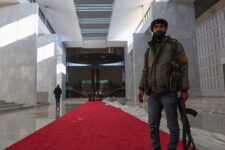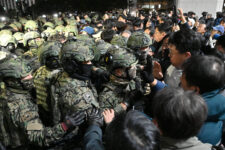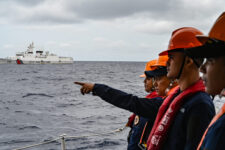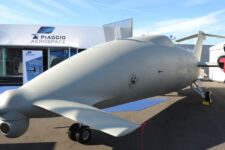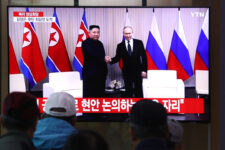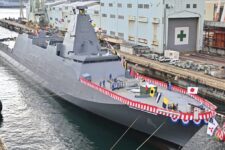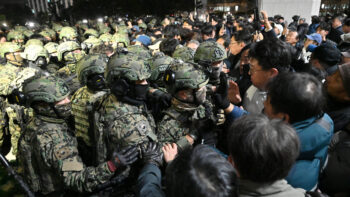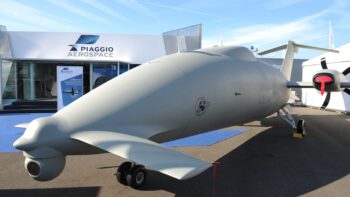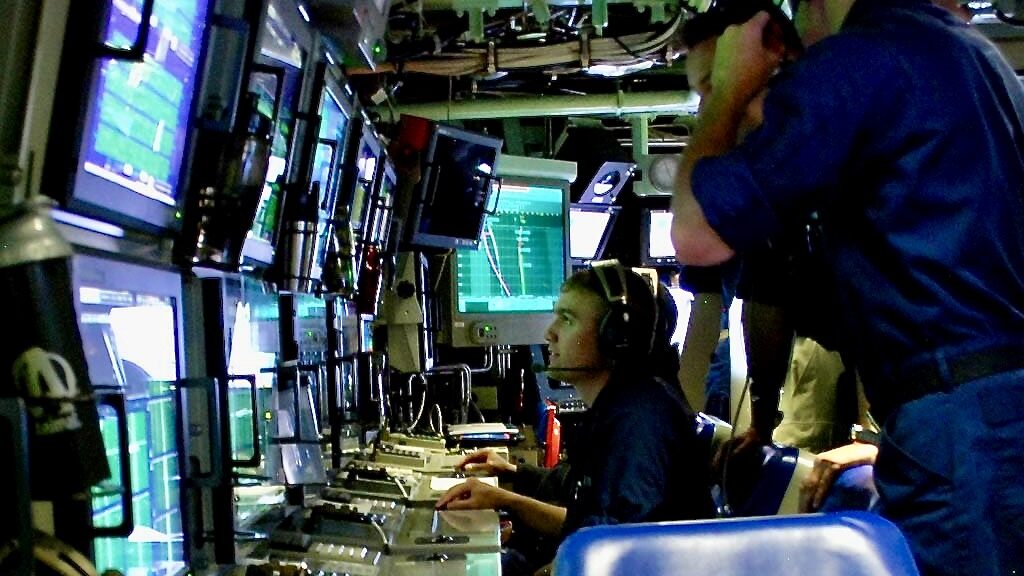
Control room of USS Minnesota, Virginia class submarine. Lockheed Martin builds the combat system for Virginia class subs of the US Navy and for Collins class subs in Australia. (Lt. Timothy A. Hawkins, US Navy)
CANBERRA — Lockheed Martin Australia, and its parent company in America, has won a string of non-competitive contracts for major weapons systems in the last six months, from C-130 transport planes to Apache attack helicopters to the command and control, ground stations and the architecture for Australia’s first sovereign space capability.
The firm also recently beat out Northrop Grumman in what many analysts consider Australia’s seminal All Domain command and control system, known as Air 6500.
On top of all that, the head of defense industry policy at Australia’s Department of Defence, Pat Conroy, has declared his country is likely to make more and more awards directly to companies when there’s an obvious winner or only one incumbent instead of competing deals — an arrangement that could greatly benefit large US-based primes. And since Lockheed Martin Australia (LMA) is tied to the world’s biggest defense contractor — an American company — the assumption is that LMA may well benefit more than most.
So Breaking Defense sat down recently with LMA chief executive Warren “Macca” McDonald, a 41-year veteran of the Australian defense department, at the company’s headquarters here to discuss AUKUS, all domain ops and what else lies ahead for the firm. (He’s known as Macca because Australians call the iconic American fast food company Macca’s rather than McDonald’s…)
The interview was edited for clarity and length.
Breaking Defense: Are you in discussions yet about the AUKUS submarine combat system? You already do all the systems for all the American submarines, and AUKUS is quite a ways down the track. (The Australian Collins-class subs use the Lockheed system as well.
McDonald: We have been. Having low-level discussions just broadly, mapping our ports. And our involvement may be for supporting the Virginia-class deployments to suit the SRF-West (Submarine Rotational Force-West ) deployments in Western Australia, when they come. We are working with the defense department to understand what skill sets would be required for that, given our knowledge and expertise in the combat system. But no in-depth discussions or negotiations on combat systems for AUKUS, which is, like you said, further down the track.
Air 6500 may be the system of greatest interest to our readers in the region, and the question of its development as an All Domain tool. How’s that shaping what you’re doing in Australia?
It’s focused on the air domain at this point in time, most squarely with Air Force.
But there is a lot of chatter about you being able to do surface, air and land.
We can pull in a lot of data depending on what defense wants to connect. So yes, you could technically bring in sub-surface domain or surface domain, or air domain. Absolutely. You know, it’s up to defense to decide how far they want to bring that domain awareness, but the system is very capable of doing so. From the conversations we’ve had, it’s still quite focused on air domain, right? But it’ll bring in land components, most definitely. Air is just the current focus, but that will shift over time.
Is the Australian military talking much about All Domain? I know people at the top who talk with the Americans are very aware of it, but do you encounter much below that?
So, most definitely, I think Australia in some ways has led the pack on integration. Our geography drives that, as well — Colin, you know that. Beyond-line-of-sight, you know, low-density assets and a large country. If you’re not connected, you’re disconnected to your disadvantage.
Are you restructuring your company at all, to make sure that people are routinely looking across at other domains?
Corporate-wide there’s a cross-domain focus to make sure that we’re looking at not just down the business areas, but what other business area can be included in the equation for a solution to a defense partner. The (Lockheed Martin Corp.) chief operating officer, Frank St. John, is driving that cross-domain awareness along with all the executive vice presidents from all the four business areas because they can see the benefit of of a connected capability outcome — and it’s most definitely resident here. So [for example] this morning, we had missiles and fire control in with Aero, in with Rotary Mission Systems talking about solution sets, and ways we can best deliver a capability. It’s alive and we are changing structures and changing procedures to make sure that we get the best outcome.
The last couple of months have been pretty remarkable for you. The [Australian defense] department announced that Lockheed got contracts for C-130s, Apaches, Blackhawks — all without competition. Now, do you think this is going to persist where the ADF issues contracts for larger competitions, and simply says, this is the best product so we’re buying this? We don’t need to do a competition?
Yes, we’ve been very fortunate. But with all that you’ve said, it’s not just about us. We deliver through partnerships. (Air) 6500 is a great example. Fifty percent of that worksheet is not us. We look at the landscape and see other people have exceptional capabilities and we wish to be able to team and partner to deliver that. For C-130J maintenance, we’ve teamed with Airbus because they provide exceptional fixed-wing sustainment.
What kind of growth do you predict for, let’s say, the next three to five years?
We’ll need to grow from 1,300 at the moment; we’ll need to grow by about 60 percent in workforce by about three to four years time.
How about revenue? Willing to make a projection?
I’ll be very frank and very open. I don’t do that stuff. I read about so many people in my position, who say, I’m going to triple revenue by whatever. I don’t get into that game. Perhaps that’s because of my defense upbringing. I know how to turn capital into capability. I look at value in a company. Revenue to me is one marker. Value is the most important marker for me. So what value? Okay, Macca, what value then?
My value would be to deliver on time, on budget the capabilities that defense requires, that I’m the most coordinated and the most capable company you deal with, that I uplift Australian industry. And then I do our very best to provide defense with the capability it needs up against a strategic backdrop. If I do all those things right, revenue will come. I don’t put it first.
